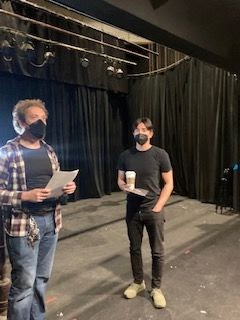
NWU Member David Trujillo is on the eve of debuting his latest play, Legacy of a Garage Band. Here he talks about the story, themes and preparation to open his show in Long Beach, CA, mid-February.
The deeper and more complex themes of my new play have to do with the opioid crisis and mental health. The garage band is the social structure I use to bring forth those issues. While much of the social and political attention surrounding the nation’s opioid crisis have focused on the dramatic increase in overdose deaths among white, middle-class, suburban/rural users, the impact of the epidemic in Black and Brown communities has largely gone unrecognized.
Legacy of a Garage Band is a story about the trials and tribulations of a group that finds out the hard way that buying opioids or fentanyl is inexpensive and easy, while getting out of the grips of addiction is expensive and complicated. They find out that you learn nothing from life until you understand love, compassion, and gentleness.
My challenge with writing has always been how to tell new and innovative stories while exploring the themes I often return to: survival and the power of the individual to overcome obstacles. The larger challenge is how to produce our stories in the theater, which has a history of excluding works by minorities.
Communities of color have stories to tell and so much talent. We have to continue to knock down the walls. I remember that some people warned me that it would be too difficult to finance, produce and direct original plays. It was almost like they wanted to discourage me. Wanted me to fail. But I kept writing. I kept breaking down the walls. This is something we, who are often excluded in the arts, must continue to do.
The shutdown due to the pandemic over the past two years has made the public more interested in popular live entertainment. It’s a basic human need to be with others. Live theater offers a unique experience of human exploration. It is an experience that should be shared by all, not just a select few. Coming out of the pandemic allows us to bring this show to new audiences. As a writer and artist, I view the pandemic as an opportunity to step back, reflect, and provide a new perspective on theater work.
In the final analysis, I am a storyteller. My approach is simple. My themes are universal but I include our community’s experience. As a playwright, it should be my task to try and bring in new audiences. To do this you have to make the audience feel the story. Have them relate to the characters and for the story to support the characters. Above all else, I have empathy for the audience. This way our stories will get told.

 NWU is the sole provider of IFJ Press Passes to freelance journalists in the U.S.
NWU is the sole provider of IFJ Press Passes to freelance journalists in the U.S.